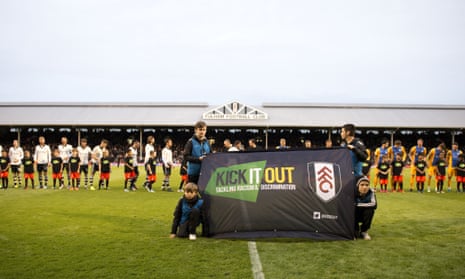The chairman of Kick It Out has urged football to do more to promote community cohesion in the face of a rising tide of hate speech and intolerance exacerbated by the Brexit debate.
Lord Ouseley said that while football should be praised for measures taken inside stadiums to stamp out discrimination, and for its community programmes, it had the power to do much more to combat the effects of a rise in prejudice in the grassroots game and beyond.
“It has been noticeable for at least two and a half years that there has been a rise in what I would call intolerance,” Ouseley told the Guardian. “That not only happens in the streets and in the playground but in higher levels of society. There is an underlying subliminal message that all came to the fore during the last few weeks with ‘We want our country back’ and so on.”
Kick It Out is making a campaign against hate speech the central plank of its communications through clubs this season and Ouseley called on them to do more to explicitly encourage community cohesion. “We’ve got to do more. We’ve got a role as educators. Football is this great sport that reaches millions. What are the messages we’re sending out? Football clubs are doing great things in the community but in a lot of cases it’s about offering people a place to play. In my mind, mixing is the best opportunity to learn about each other. It’s got to have a component where those who are coaching, those in leadership positions, recognise it’s an important point of learning to grow up in our society.”
He added: “We can’t solve the problem of hate without recognising it in every strata of our society. We’ve got a responsibility to young people who are the next generation. I’ve been trying to get football to realise there is a greater responsibility. That’s not to say it’s not happening but it needs to happen with greater fervour, really embracing the way in which football can be a force for good.”
He said that although discrimination inside stadiums is now effectively policed, the problem has tended to move elsewhere. “People know that there are certain things you don’t say. People leave their prejudice at the gate and pick it up on the way out. That means that the lower down you go, the more it manifests itself. We have to really look at what is going on at grassroots – the lower down you go, there are no cameras, there is no complaints system.
“Schools, playgrounds, the streets. That’s where the next generation are and many of them can’t afford to go to Premier League football. It’s lower down that we’ve got a big problem. In the grassroots game people don’t complain because they don’t think anything will be done.”
As one simple step, he said he would like to see the Premier League invest in a campaign similar to Uefa’s “Say No to Racism” slots during Champions League matches. “It’s saying we’ve got people here from all the around the world playing this game and enjoying this game. It’s saying we’re not going to accept hate. Those things resonate. They don’t necessary alter behaviour because people are getting a daily diet of something else but it stops and makes them think. I genuinely believe that.”
The independent crossbench peer said the depressing scenes in France over the summer, where a minority of England fans revelled in xenophobic chanting and were filmed abusing Romany children, were an example of what happened when people felt empowered to display racist views. “What happened in France didn’t surprise me,” he said. “If you’ve got people who are used to concealing their prejudice and suddenly feel comfortable about displaying it, it’s easy for those things that are part of you to bubble to the surface.
“It hasn’t gone away. It also comes from this recent exposure and diet they were getting from everything around [Brexit] campaigning that sent out the wrong messages, the subliminal hatred of other people came through all the debating that was happening. People did feel empowered and felt they now had a licence to say what they liked.”
Kick It Out statistics collected during Euro 2016 to monitor online discriminatory abuse showed 22,000 direct instances during the tournament. Of those, approximately 10,000 were aimed at the England squad. Ouseley said he had detected a rise in prejudice in football and beyond.
“You can sense that people are looking at foreigners, immigrants, people coming from the EU, and the message is coming across through politicians, how that is reported in the print media, how that is reflected on the front pages of certain newspapers,” he said. “That feeds a frenzy of people who are looking for something to blame. Football has made progress but we’ve got to keep on making progress in how we complain, how we regulate, how we sanction, how we get that message across.”
With the departing Football Association chairman, Greg Dyke, having failed in his most recent attempt to reform the organisation and diversify the make-up of the FA Council, Ouseley, who quit the body in frustration at the pace of change in 2012, said there was a long way to go in governing bodies and the clubs.
“Look at the boardroom, look at the senior management, look at the coaching staff then look at the bottom,” he said. “Look at clubs and you’ll see a lot more black and Asian people working in security and catering and so on. There is no progress there at all. The FA have made one step in the right direction with Heather Rabbatts. But it’s only one step. Let’s make some more giant steps.
“If you only ever see white men in power and in positions of authority, it represents a problem in terms of the balance of the sexes and different ethnic groups.”
The sports minister, Tracey Crouch, said recently she would remove the FA’s public funding of £30m over four years if it did not commit to significant governance changes by next year. Ouseley called on Crouch and the prime minister, Theresa May, to continue to push for a “harder-edged” solution.
“How do you change the FA from being a white boys’ club? How do you change the Football League? You’ve got to realise that unless you do something about changing things then nothing will change.”









